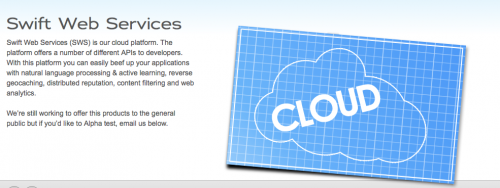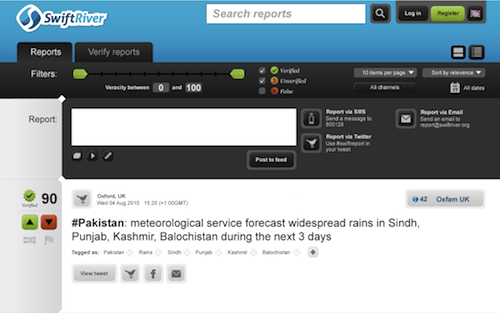In an age of information abundance, curating meaning is key.
9 months ago that is just what Jon Gosier set out to do as he took over the reins of the SwiftRiver initiative at Ushahidi. Today he announces the Beta release, and unveils the new website at Swiftly.org.
What is SwiftRiver?
SwiftRiver Open Beta Announcement. from Ushahidi on Vimeo.
“SwiftRiver is an open source intelligence gathering platform for managing realtime streams of data.”
Using 5 different tools in the toolbox, you can create a host of useful applications. Tools ranging from natural language processing to handling duplicates, or a source’s importance in the ecosystem. Much like a box of Lego’s, the value and usefulness of the apps created are up to the creator.
SwiftRiver lets users:
- Manage realtime data streams (e.g. RSS, SMS, Twitter, Email)
- Identify relationships between content (e.g. email and tweets)
- Set parameters to auto-filter incoming feeds
- Curate content based on preferences
Swift code and web services
Like all Ushahidi work, the code is free and open source, anyone can download it, contribute to the code, and run it on their own server. Due to it’s complexity, SwiftRiver also offers a software as a service solution, allowing you to tap our servers for your own needs. Swift Web Services (SWS) is our cloud platform. The platform offers a number of different APIs to developers. With this platform you can easily beef up your applications with natural language processing & active learning, reverse geocaching, distributed reputation, content filtering and web analytics.

This first app, called the Sweeper is the first project to enter Beta and now ships with SwiftRiver. Sweeper, is a term Ushahidi uses to refer to people who ’sweep’ through a system, performing certain tasks, and it was for this reason that we put the Ushahidi resources behind the whole initiative.
History, contributors and code
The origins of SwiftRiver are in the community of Ushahidi developers and users. Chris Blow and Kaushal Jhalla asked some hard questions after the Mumbai terrorist attacks in 2008, discussing the need for something that can help with this information overload we have in the first few hours of an emergency or disaster. Today, we’re seeing the first fruits of that technology, and it’s exciting to know that the potential for it’s use goes far beyond the crisis scenarios that we first envisioned.
Matthew Griffiths (Uganda) and Neville Newey (South Africa) have done a great job hacking out much of the code and designing the architecture for the platform. They’ve been joined by an army of volunteers and contributors, including: Joshua Bronson, Soe, Nishith Rastogi, Mang-Git Ng, Josh Bronson, Ivan Kavuma, Andrew Turner, Chris Blow, Kaushal Jhalla, Ed Bice, Moses Mugisha, Victor Miclovich, Wolfgang Werner, M. Edward Borasky, Maarten J. van der Veen, Ahmed Maawy, Colin Meinke. A huge round of thanks to everyone who gave freely of their time and energy to move this project forward!
Find out more on the website at Swiftly.org
Download the code, v.0.5 Cape Jazz

0 Comments
1 Pingback